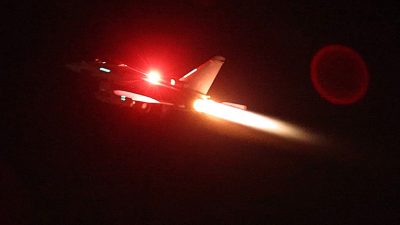How the US Misleads the World About Its Involvement in Yemen. Scott Ritter
While Washington maintains that the strikes on Houthi installations are defensive and fully legal, neither is the case

All Global Research articles can be read in 51 languages by activating the Translate Website button below the author’s name (only available in desktop version).
To receive Global Research’s Daily Newsletter (selected articles), click here.
Click the share button above to email/forward this article to your friends and colleagues. Follow us on Instagram and Twitter and subscribe to our Telegram Channel. Feel free to repost and share widely Global Research articles.
New Year Donation Drive: Global Research Is Committed to the “Unspoken Truth”
***
“The strikes in Yemen were necessary, proportionate, and consistent with international law.”
With this statement, the United States delegate to the United Nations defended the joint US-UK military strikes against targets affiliated with the Houthi militia undertaken on the night of January 12, 2024.
The irony of this statement is that it was made before a body, the United Nations Security Council, which had not authorized any such action, thereby eliminating any claim to legitimacy that could possibly be made by the US.
The Charter of the UN specifies two conditions under international law in which military force can be used. One is in the conduct of legitimate self-defense as articulated in Article 51 of the Charter. The other is in accordance with the authority granted by the UN Security Council through a resolution passed under Chapter VII of the Charter.
British Foreign Minister David Cameron cited the UN Security Council in his justification of the UK’s involvement in the attacks on Yemen, claiming that the Council had “made clear” that the “Houthi must halt attacks in the Red Sea.”
While the Security Council had issued a resolution demanding that the Houthi cease their attacks on international shipping in the Red Sea, this resolution was not passed under Chapter VII, and therefore neither the US nor the UK had any authority under international law to carry out their attacks on Yemen.
Both the US and UK invoked the notion of self-defense in their attacks on Yemen, thereby indirectly alluding to a possible cognizable action under Article 51 of the UN Charter. US President Joe Biden justified the US military attack on Houthi militia forces in Yemen in a statement released shortly after the strikes ended.
“I ordered this military action,” he declared, “in accordance with my responsibility to protect Americans at home and abroad.”
The main problem with this argument is that the Houthis had not attacked Americans, either at home or abroad. To the extent that US forces had previously engaged weapons fired by the Houthis, they had done so to shield non-American assets – either the State of Israel or international shipping – from Houthi attack. Under no circumstances could the US argue that it had been attacked by the Houthis.
The US attacks, Biden asserted, “were carried out to deter and weaken the Houthi ability to launch future attacks.”
This language suggests that the US was seeking to eliminate an imminent threat to commercial maritime operations in international shipping lanes. To comply with the requirements of international law regarding collective self-defense – the only possible argument for legitimacy since the US itself had not been attacked – the US would need to demonstrate that it was part of a collective of nation states that were either under attack by the Houthis or were threatened with imminent attack of a nature that precluded seeking Security Council intervention.
In late December 2023, the US had, together with several other nations, gathered military forces in what was known as Operation Prosperity Guardian to deter Houthi attacks on maritime shipping that had been taking place since November 19, 2023.
However, the US subsequently undermined any case it could possibly have made that its actions were consistent with international law, namely that they were an act of collective pre-emptive self-defense done in accordance with Article 51 of the UN Charter.
US Central Command (CENTCOM), which is responsible for operations in the Middle East, issued a press release shortly after Washington launched a second attack against a Houthi radar installation that it claims was involved in targeting shipping in the Red Sea.
The statement claimed the attack on the Houthi radar installation was a “follow-on action” of the strikes carried out on January 12, and had “no association with and are separate from Operation Prosperity Guardian, a defensive coalition of over 20 countries operating in the Red Sea, Bab al-Mandeb Strait, and the Gulf of Aden.”
By distancing itself from Operation Prosperity Guardian, the US has fatally undermined any notion of pre-emptive collective self-defense under Article 51 of the UN Charter, highlighting the unilateral, and inherently illegal, nature of its military attacks on Yemen.
*
Note to readers: Please click the share button above. Follow us on Instagram and Twitter and subscribe to our Telegram Channel. Feel free to repost and share widely Global Research articles.
Scott Ritter is a former US Marine Corps intelligence officer and author of ‘Disarmament in the Time of Perestroika: Arms Control and the End of the Soviet Union.’ He served in the Soviet Union as an inspector implementing the INF Treaty, in General Schwarzkopf’s staff during the Gulf War, and from 1991-1998 as a UN weapons inspector.
Featured image: A RAF Typhoon aircraft taking off RAF Akrotiri to join the US-led coalition to conduct air strikes against military targets in Yemen. © AFP / British Ministry of Defence

